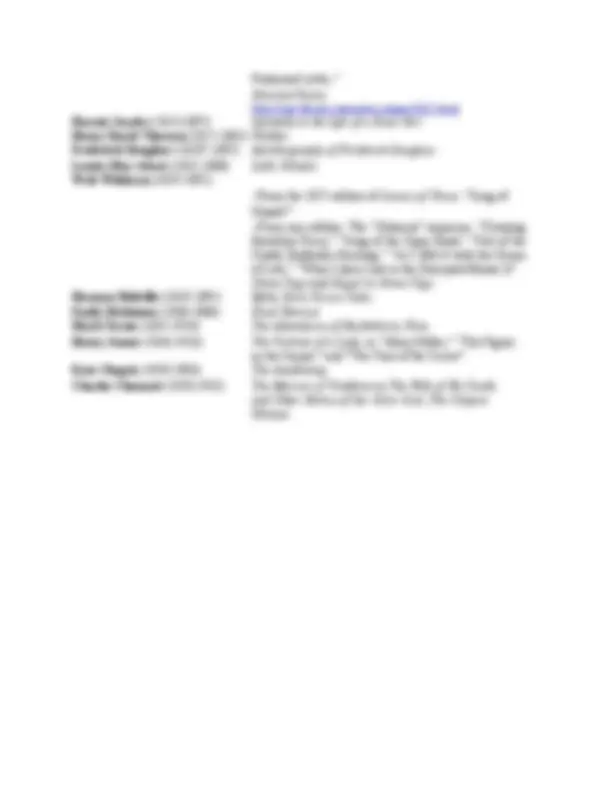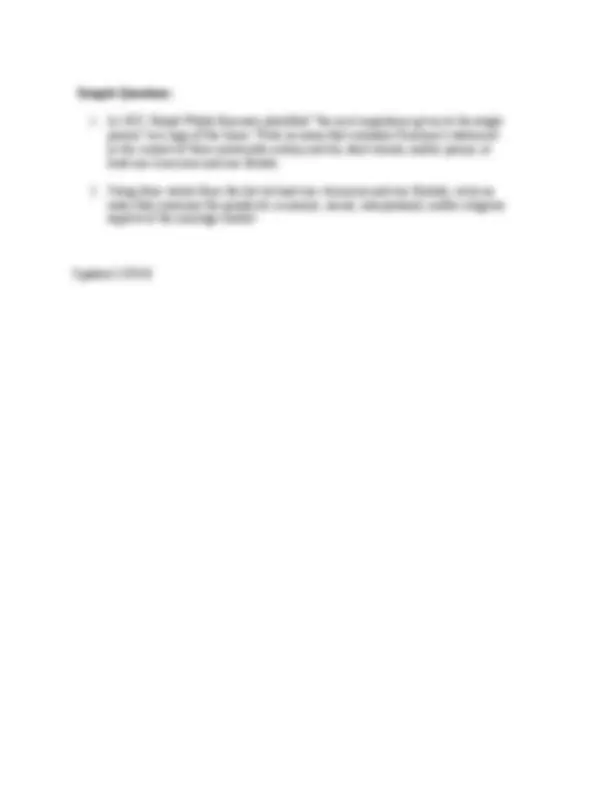




Study with the several resources on Docsity

Earn points by helping other students or get them with a premium plan


Prepare for your exams
Study with the several resources on Docsity

Earn points to download
Earn points by helping other students or get them with a premium plan
Community
Ask the community for help and clear up your study doubts
Discover the best universities in your country according to Docsity users
Free resources
Download our free guides on studying techniques, anxiety management strategies, and thesis advice from Docsity tutors
A reading list for the SJSU MA Exam, focusing on major 19th century writers/texts from the U.K. and U.S.A. Students should have a general knowledge of the definitions and rules of the various forms and genres popular during the British Romantic and Victorian literary periods, as well as the American Romantic, Transcendentalist, and Realist movements.
Typology: Slides
1 / 4

This page cannot be seen from the preview
Don't miss anything!



Dept. of English & Comparative Literature, SJSU MA Exam Reading List: Group 2
Description: This part of the MA exam focuses on major 19 th^ century writers/texts from the U.K. and U.S.A. Students should have a general knowledge of the definitions and rules of the various forms and genres popular during the British Romantic and Victorian literary periods, as well as the American Romantic, Transcendentalist, and Realist movements. Students should also pay attention to how these forms and genres are used/deployed in different historical and cultural moments. Poetry: ● Lyrical ballad ● Odal hymn ● Elegy ● Sonnet (Petrarchan, Miltonic, Shakespearean) ● Broadsides Prose: ● Gothic Novel ● Historical Romance ● Bildungsroman ● Domestic Novel ● Detective Novel ● Serialized Novel ● Silverfork Novel ● Slave Narrative ● Short Story ● Sketch ● Tall Tale Students should also familiarize themselves with the general biographical, cultural, historical, and political for the various texts and their related periods. A review of the information included in the introduction and headnotes in most anthologies is sufficient; however, the Broadview anthologies offer the most current and diverse historical context on these periods.
British: Romantic-era (1775-1835) and Victorian-era (1835-1902) Literature Charlotte Smith (1749-1806) Elegiac Sonnets (1795) William Blake (1757-1827) Songs of Innocence and Experience Mary Wollstonecraft (1759-97) Vindication of the Rights of Men , Vindication of the Rights of Woman William Wordsworth (1770-1850) and Samuel Taylor Coleridge (1772-1834) Lyrical Ballads (1798 version), Preface to the 1800 edition of Lyrical Ballads Jane Austen (1775-1817) Pride and Prejudice or Northanger Abbey George Gordon, Lord Byron (1788-1824) Don Juan Percy Bysshe Shelley (1792-1822) “Prometheus,” “Hymn to Intellectual Beauty,” “Ozymandias,” “Mutability,” “England in 1819,” A Defence of Poetry John Keats (1795-1821) “The Eve of St. Agnes,” La Belle Dame sans Merci,” “Ode to a Nightingale,” “Ode on a Grecian Urn” Mary Wollstonecraft Shelley (1797-1851) Frankenstein (1818) and Introduction to 1831 version of Frankenstein Alfred, Lord Tennyson (1 809 - 92) In Memoriam, “ The Palace of Art,” “The Lady of Shalott” Charlotte Brontë (1816-55) Jane Eyre Emily Brontë (1818-48) Wuthering Heights Charles Dickens Dombey and Son or Bleak House George Eliot (1819-80) Middlemarch or The Mill on the Floss Thomas Hardy (1840-1928) Jude the Obscure or Tess of the D’Urbervilles Oscar Wilde (1854-1900) The Importance of Being Earnest or, The Picture of Dorian Gray American: Romanticism (c. 1820- c. 1865), Transcendentalism (1820s-1850s), Realism (c. 1860 - c. 1914) Susanna Rowson (1762-1824) Charlotte Temple Ralph Waldo Emerson (1803-1882) “Nature,” “The Poet,” “The American Scholar,” “The Over-Soul,” “Experience,” “Fate,” “The Rhodora,” “Circles.” Nathaniel Hawthorne (1804-1864) The Blithedale Romance or The House of the Seven Gables , “My Kinsman, Major Molineaux,” “Rappaccini’s Daughter,” “Young Goodman Brown,” “The Minister’s Black Veil,” “The Artist of the Beautiful,” “The Old Manse.” Edgar Allan Poe (1809-1849) The Narrative of Arthur Gordon Pym , “The
Sample Questions: